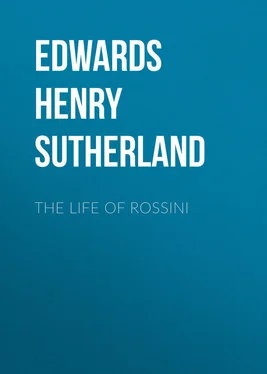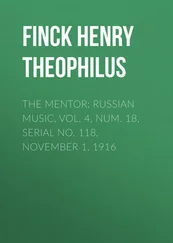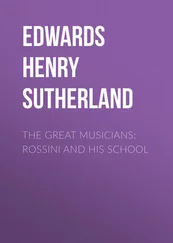Henry Edwards - The Life of Rossini
Здесь есть возможность читать онлайн «Henry Edwards - The Life of Rossini» — ознакомительный отрывок электронной книги совершенно бесплатно, а после прочтения отрывка купить полную версию. В некоторых случаях можно слушать аудио, скачать через торрент в формате fb2 и присутствует краткое содержание. Жанр: foreign_antique, foreign_prose, на английском языке. Описание произведения, (предисловие) а так же отзывы посетителей доступны на портале библиотеки ЛибКат.
- Название:The Life of Rossini
- Автор:
- Жанр:
- Год:неизвестен
- ISBN:нет данных
- Рейтинг книги:4 / 5. Голосов: 1
-
Избранное:Добавить в избранное
- Отзывы:
-
Ваша оценка:
- 80
- 1
- 2
- 3
- 4
- 5
The Life of Rossini: краткое содержание, описание и аннотация
Предлагаем к чтению аннотацию, описание, краткое содержание или предисловие (зависит от того, что написал сам автор книги «The Life of Rossini»). Если вы не нашли необходимую информацию о книге — напишите в комментариях, мы постараемся отыскать её.
The Life of Rossini — читать онлайн ознакомительный отрывок
Ниже представлен текст книги, разбитый по страницам. Система сохранения места последней прочитанной страницы, позволяет с удобством читать онлайн бесплатно книгу «The Life of Rossini», без необходимости каждый раз заново искать на чём Вы остановились. Поставьте закладку, и сможете в любой момент перейти на страницу, на которой закончили чтение.
Интервал:
Закладка:
CHAPTER IV
MOZART AND ROSSINI
NEW instruments have been introduced since Mozart’s time. It has become the fashion still farther to shorten recitatives; the chorus has been made more prominent than ever in Italian Opera, and Verdi gives it flowing melodies to sing as to a soloist of fifty-voice power. Nevertheless, in all essentials, no progress in the composition of dramatic music has been made since “Don Giovanni;” and if Mozart’s operas had been known in Italy when Rossini began to write, then, instead of saying that Rossini took this idea from Cimarosa and from Paisiello, that from Gluck, that from Haydn, it would be much simpler to say that he took all that was new in the construction of his works from Mozart.
Rossini could scarcely have studied Mozart’s works – certainly not their effect on the stage – when, in 1813, he produced “Tancredi;” in fact, “Tancredi” presents much less modern forms than the “Marriage of Figaro” and “Don Giovanni,” written a quarter of a century earlier. But it must be remembered that Rossini did not perfect his style until about 1816, the year of “Otello” and of the “Barber of Seville;” and in the meanwhile La Scala had represented “Don Giovanni” (1814), and with much greater success “Le Nozze di Figaro” (1815).
Mozart may have prepared the way for Rossini’s European success, and Rossini certainly profited in a direct manner by all Mozart’s reforms in the lyric drama. Still he may be said to have arrived independently of Mozart’s influence at many of Mozart’s results. Even in what passes specially for a reform introduced by Rossini, the practice of writing airs, ornaments, and all, precisely as they are to be sung, Rossini had been anticipated by Mozart, by Gluck, by Handel, by all the German composers. Nevertheless, it was not in deliberate imitation of the more exact composers of Germany, it was for the sake of his own music that Rossini made this important innovation, which no composer has since departed from.
Out of Germany Mozart’s operas only became known a very short time before those of Rossini. Mozart was at once appreciated by the Bohemians of Prague, but his success was contested, by the Germans of Vienna, and it may be said with only too much truth that his masterpieces met with no general recognition until after his death. Joseph II. cared only for Italian music, and never gave his entire approbation to anything Mozart produced, though some of the best musicians of the period, with Haydn and Cimarosa at their head, acknowledged him to be the greatest composer in Europe.
The Emperor thought there were “too many notes” in the “Entführung aus dem Serail,” in spite of Mozart’s assurance that there were “precisely the proper number.” The “Marriage of Figaro,” not much esteemed by the Court, was hissed by the Viennese public on its first production; while “Don Giovanni” itself, in spite of its success at Prague, was quite eclipsed at Vienna by the “Assur” of Salieri. Cimarosa in the meanwhile was idolised at Court. The Emperor Leopold, at the first representation of “Matrimonio Segretto,” encored the whole work, and loaded the composer with honours and riches; but he never really appreciated Mozart’s works.
The influence of a clique of hostile Italian musicians living at Vienna, also, no doubt, counted for something. In taking an important part in the establishment of German Opera, Mozart threatened to diminish the reputation of the Italian school. The “Entführung aus dem Serail” was the first blow to the supremacy of Italian Opera; “Der Schauspiel-direktor” was the second; and when, after the production of this latter work at the New German Theatre of Vienna, Mozart proceeded to write the “Nozze di Figaro” for the Italians, he simply placed himself in the hands of his enemies.
It cannot be said that in Italy Mozart’s recognition was delayed by mere national prejudice; but his works presented great executive difficulties; many of the pieces were too complex for the Italian taste, while in others too much importance was assigned to the orchestra, too little to the voices. Mozart, moreover, was not in the country to propose and superintend the production of his works, and the Italian composers, his contemporaries, thought, no doubt, that they did enough, in getting their own brought out.
Ultimately it was through Italian singers that both “Don Giovanni” and “Le Nozze di Figaro” became known throughout Europe; but Mozart’s two great operas, though written fully thirty years before Rossini’s best works, were not introduced in Italy, France, and England, until about the same time. It took Mozart upwards of a quarter of a century to make the journey from Vienna to London; whereas Rossini, from Rome and Naples, reached both London and Paris in three or four years.
CHAPTER V
ROSSINI’S REFORMS IN SERIOUS OPERA
WE have seen that when Rossini’s “Tancredi” was first brought out in London, Lord Mount-Edgcumbe did not know what to make of it, and thought Italian Opera was coming to an end; whereas, as far as that generation was concerned, it was only just beginning. “Tancredi” has, in the present day, somewhat of an old-fashioned, or rather, let us say, antique character. Many of the melodic phrases, by dint of fifty years’ wear, have lost their primitive freshness; and they are often decorated in a style which, good or bad, does not suit the taste of the present day. But it marks the commencement of the reforms introduced by Rossini into opera seria, and it is the first work by which he became known abroad. A very few years after its first production at Venice, “Tancredi” was played all over Europe.
To most opera goers of the present-day, the recitatives of “Tancredi” will appear sufficiently long – they are interminable compared with the brief recitatives by which Verdi connects his pieces. But before the time of “Tancredi,” dialogue in recitative may be said to have formed the ground-work and substance of opera; and many an opera seria consisted almost entirely of recitative broken here and there by airs for a single voice. The opera buffa was richer in concerted music; and Rossini, speaking broadly, introduced the forms of opera buffa into opera seria. For much declamation he substituted singing; for endless monologues and duologues, ensembles connected and supported by a brilliant orchestra. The bass singer was still kept somewhat in the background. But he had a part; his personality was recognised; and some of the amateurs of the old school pointed to him in “Tancredi” with prophetic eye, and sadly foretold that, having been allowed to make his first step, he would be gradually brought forward until, at last, he would stand prominently in the front – as he in fact did a very few years afterwards in Rossini’s “Mosè.”
Before “Tancredi” the bass took no part in tragic opera. Then, in addition to the new distribution of parts, the new arrangement of the dramatic scenes, the elaborate finale, the bright sonorous instrumentation, there were the charming melodies, there was the animation of the style, which, whatever the plan of the work, would certainly have sufficed to ensure it a large measure of success. All who heard the opera must, consciously or unconsciously, have felt the effect of Rossini’s admirable innovations; but what chiefly excited the enthusiasm of the public was the beauty of the melodies. All Venice sang the airs from “Tancredi,” the gondoliers made them into serenades; Rossini was followed by them wherever he went. It is said that they used even to be introduced in the law courts, and that the judges had more than once to stop the humming of “mi rivedrai, te revedro.” “I thought when they heard my opera,” said Rossini, “that the Venetians would think me mad. But I found that they were much madder than I was.”
Читать дальшеИнтервал:
Закладка:
Похожие книги на «The Life of Rossini»
Представляем Вашему вниманию похожие книги на «The Life of Rossini» списком для выбора. Мы отобрали схожую по названию и смыслу литературу в надежде предоставить читателям больше вариантов отыскать новые, интересные, ещё непрочитанные произведения.
Обсуждение, отзывы о книге «The Life of Rossini» и просто собственные мнения читателей. Оставьте ваши комментарии, напишите, что Вы думаете о произведении, его смысле или главных героях. Укажите что конкретно понравилось, а что нет, и почему Вы так считаете.












